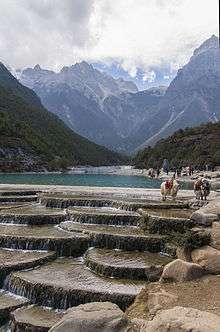Jade Dragon Snow Mountain
| Jade Dragon Snow Mountain | |
|---|---|
 Jade Dragon Snow Mountain towering over nearby Lijiang | |
| Highest point | |
| Elevation | 5,596 m (18,360 ft) |
| Prominence |
3,202 m (10,505 ft) [1] Ranked 71st |
| Isolation | 141 kilometres (88 mi) |
| Listing | Ultra |
| Coordinates | 27°05′54″N 100°10′30″E / 27.09833°N 100.17500°ECoordinates: 27°05′54″N 100°10′30″E / 27.09833°N 100.17500°E [1] |
| Geography | |
| Parent range | Yùlóngxuě Shān |
| Climbing | |
| First ascent | 1987 by Phil Peralta-Ramos and Eric Perlman[2] |
| Easiest route | East side: snow/rock climb[2] |
Jade Dragon Snow Mountain (simplified Chinese: 玉龙雪山; traditional Chinese: 玉龍雪山; pinyin: Yùlóng Xuěshān) is a mountain massif (also identified as a small mountain range) in Yulong Naxi Autonomous County, near Lijiang, in Yunnan province, southwestern China. Its highest peak is named Shanzidou (扇子陡) (5,596 m or 18,360 ft).
Other names
The range is also known as Mount Yulong after the Chinese or Mount Satseto after the Naxi name.[3] Another translated name is Yulong Snow Mountain.[4]
Location
The view of the massif from the gardens at the Black Dragon Pool (Heilong Tan) in Lijiang is noted as one of China's finest views, and part of Yulong Snow Mountain Scenic Area, a AAAAA-classified scenic area.[5]
The far side of the mountain forms one side of Tiger Leaping Gorge (Hutiao Xia). The Jade Water Village is at the foot of the mountain.
Exploration history

Shanzidou has been climbed only once,[6] on May 8, 1987, by an American expedition.[2] The summit team comprised Phil Peralta-Ramos and Eric Perlman. They climbed snow gullies and limestone headwalls, and encountered high avalanche danger and sparse opportunities for protection. They rated the maximum technical difficulty of the rock at YDS 5.7.
The Austro-American botanist and explorer Joseph Rock spent many years living in the vicinity of Mt Satseto, and wrote about the region and the Naxi people who occupy it. An interest in Rock later drew the travel writer Bruce Chatwin to the mountain, which he wrote about in an article that appeared in the New York Times[7] and later, retitled, in his essay collection What Am I Doing Here?.[8] Chatwin's article inspired many subsequent travellers, including Michael Palin,[9] to visit the region.
The mountain was featured on Episode 4 of The Amazing Race 18.
 Yak and cascading pools with the mountain in the background
Yak and cascading pools with the mountain in the background View of Jade Dragon Mountain
View of Jade Dragon Mountain Glacier on top of the mountain
Glacier on top of the mountain
References
| Wikimedia Commons has media related to Jade Dragon Snow Mountain. |
- 1 2 "China III - Sichuan and Yunnan Provinces". Peaklist.org. Retrieved 2014-08-25.
- 1 2 3 Eric S. Perlman, "Yulong Shan", American Alpine Journal, 1988, p. 265.
- ↑ "Yunnan's Ancient Cities: Dali-Shaxi-Lijiang". Exotissimo. Retrieved December 13, 2012.
[Jade Dragon] mountain, also called Satseto in the Naxi language, takes its name from the God of War in the Dongba religion.
- ↑ Zongxing Li. Study on Climate Change in Southwestern China. Springer Science+Business Media. p. 57. ISBN 978-3-662-44741-3. ISSN 2190-5053. LCCN 2014951737.
- ↑ "AAAAA Scenic Areas". China National Tourism Administration. 16 November 2008. Archived from the original on 4 April 2014. Retrieved 9 April 2011.
- ↑ Tamotsu Nakamura, "East of the Himalaya", American Alpine Journal, 2003, p. 146.
- ↑ Chatwin, Bruce. "In China, Rock's Kingdom", New York Times, March 16th 1986
- ↑ Chatwin, Bruce (1989) "Rock's World", in What Am I Doing Here?, Vintage, p.206
- ↑ Palin, Michael (2005) "Himalaya - Day 82: Lugu Lake to Lijiang", Retrieved 2011-01-13
